Chaga are a rare species of mushrooms that grow on birch trees in cold, northern forests around the world. Chaga mushrooms have a long history of medicinal use stretching back to prehistoric times, and have been the subject of extensive scientific research in recent years into their antioxidant and anti-inflammatory properties.
Chaga mushroom powder can be used to make hot tea, or can be taken directly as a powder or in a capsule. While research is still in the early stages, many people are excited about chaga’s potential as a supplement for boosting the immune system, and promoting anti-aging, anti-obesity, and anti-oxidative activity.
If you want to try out this rare and powerful medicinal mushroom, check out our rankings of the best chaga mushrooms on the market.
Research
Rankings
1. Maine Chaga Powder
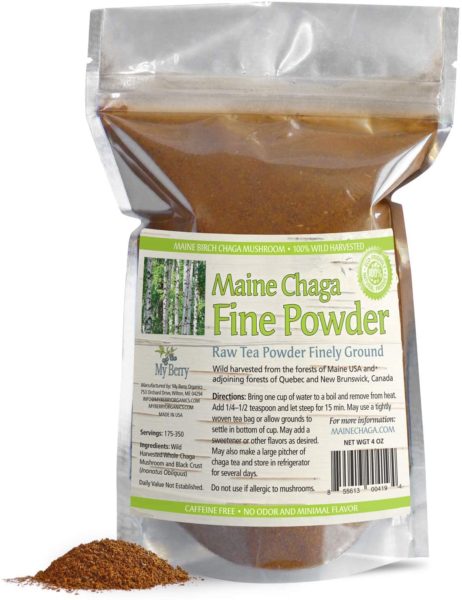
Maine Chaga is a finely-powdered raw chaga mushroom supplement that is sustainably harvested from wild birch trees in northern Maine and Canada.
Using wild-harvested chaga means you’ll get all of the natural antioxidants that develop over the course of years as chaga mushroom grows, and the sustainable harvesting practices mean you don’t have to worry about depletion of the species in the forests that it is harvested from. If you are looking for pure, powdered, raw chaga, there’s no better option on the market.
2. Micro Ingredients Organic Chaga Mushroom 100:1 Powder
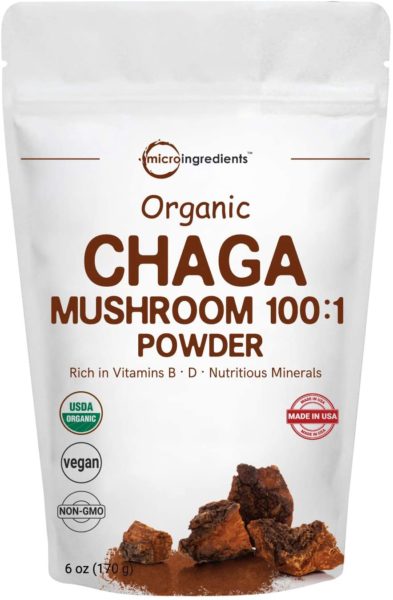
Micro Ingredients is a highly reliable source for raw plant-based supplements, and that reputation holds up with their chaga mushroom supplement.
This product comes with six ounces of powdered chaga mushrooms, with no additional ingredients or processing applied to it.
The chaga comes from sources grown in the United States, and the product is organically certified, meaning you don’t have to worry about pesticide or herbicide contamination. If you want a raw but powdered form of chaga for mixing into smoothies or shakes, Micro Ingredients is a great choice.
3. Maine Chaga Tea Chunks
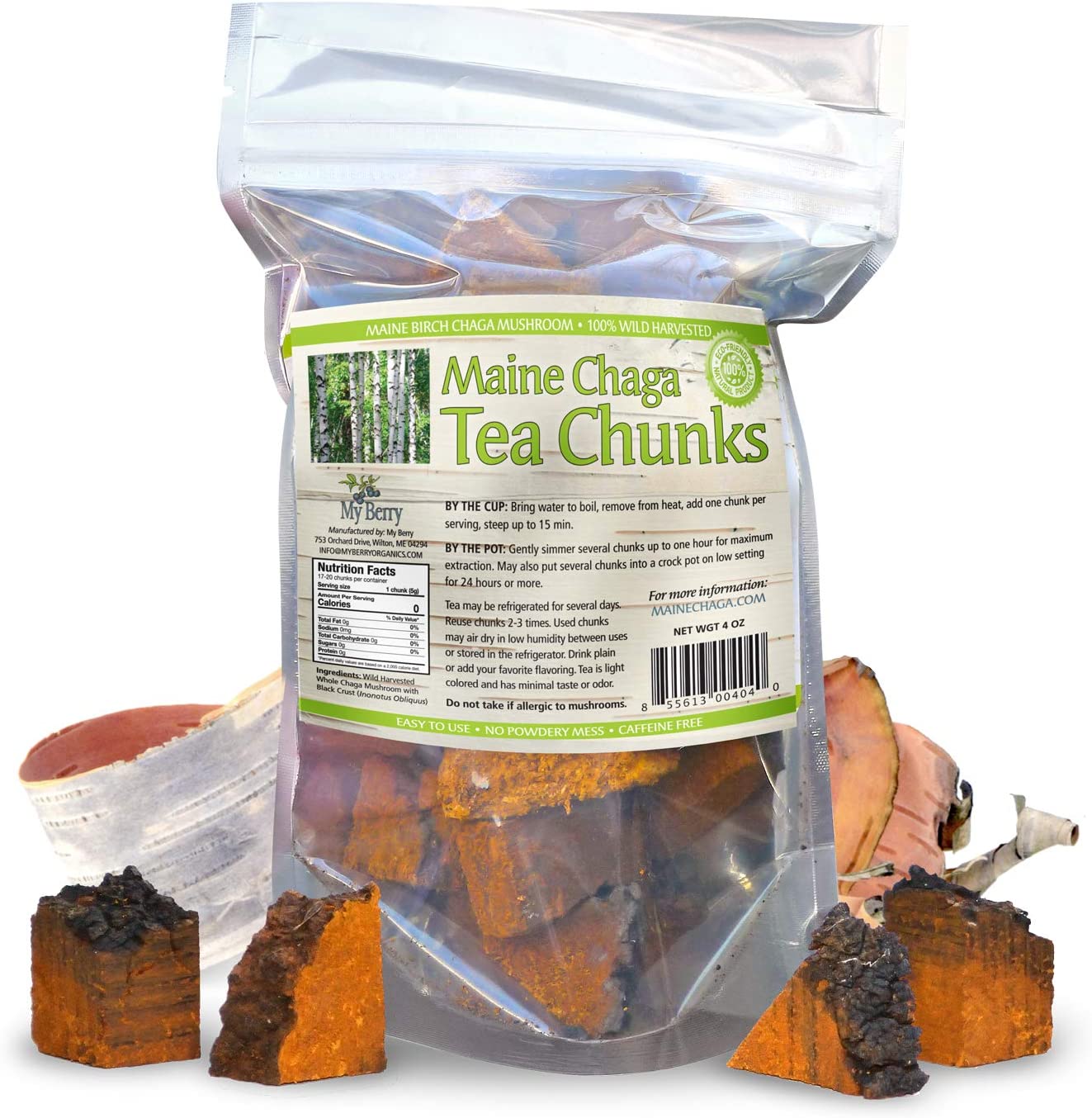
Maine Chaga provides small chunks of dried chaga mushroom in a resealable bag that make for great granules when making chaga tea. While you can make chaga tea with powdered chaga, it can be a real pain to get the fine-grained chaga particles out of the water without some aggressive filtering.
Using chunks of raw chaga like these makes drinking chaga tea a cinch: just simmer one or two chunks of chaga in water for at least 20 minutes, fish out the chunks and enjoy. The sustainable harvesting practices of Atomic Nature make these raw chaga mushrooms an excellent buy.
4. Real Mushrooms Chaga Digestive Health
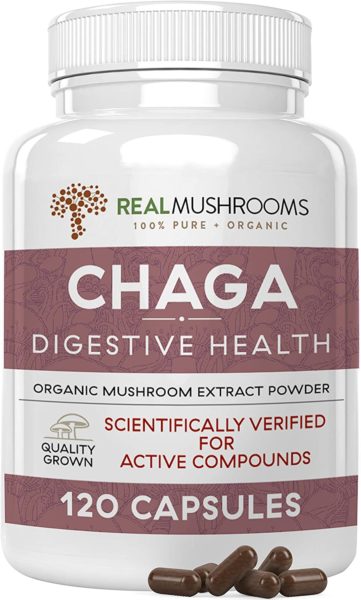
Real Mushrooms Chaga Digestive Health is a capsule-based chaga supplement with 500 mg of chaga mushroom powder per capsule. The chaga used to make these supplements is wild-harvested in Siberia, and Real Mushrooms uses independent lab testing to verify the levels of beta glucans in each batch.
This makes Real Mushrooms a good choice if you want to take advantage of some of the specific benefits of beta glucans, like lowering blood lipids. The capsule-based form makes Real Mushrooms Chaga ideal for people who don’t have the time to be measuring and mixing chaga powder, or steeping raw chaga mushrooms.
5. Host Defense Mushrooms Liquid Chaga Extract
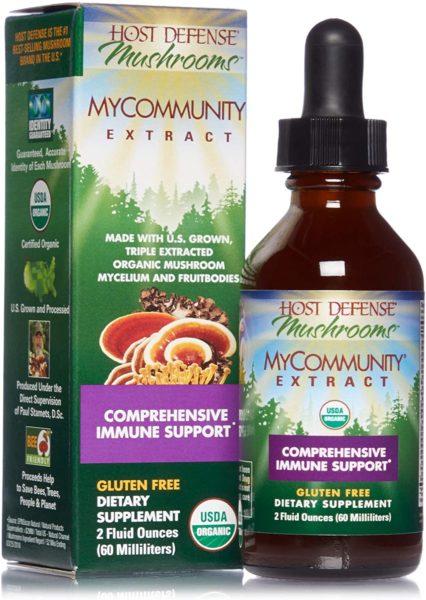
Host Defense, known for their capsule-based chaga mushroom supplements, also makes the best liquid chaga elixir on the market.
Liquid chaga extract stands a better chance of delivering more antioxidants than capsule-based chaga supplements, because many of the biologically active compounds in chaga can only be extracted using hot water or ethanol. Host Defense is an alcohol-based solution, which might be a turn-off for some people.
The absolute best way to extract all of the biologically active compounds in chaga is with hot water (for example, by making tea), but alcohol is a good second option, and is the form of chaga that has been used in clinical trials. If you want a form of chaga that is easy to take but also effective, this liquid chaga extract is a good option.
6. Host Defense Chaga Mushroom Capsules
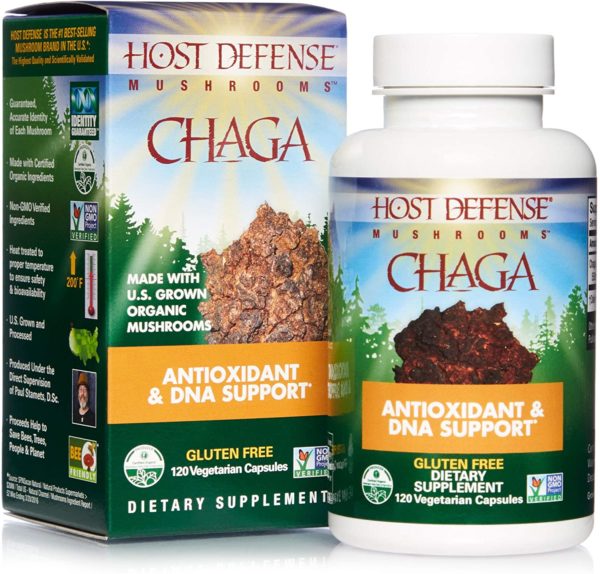
Host Defense is a great option for those who don’t want to fuss with powdered or raw chaga mushrooms. Host Defense Chaga Mushrooms come in large plant-based capsules that deliver 500 mg of raw chaga powder per capsule.
Aside from a small amount of brown rice powder and the plant-derived pullulan that makes up the capsule, there are no additional ingredients, making this one of the simplest capsule-based chaga supplements on the market.
While powder or chunk-based chaga mushroom products have some advantages over capsule-based products, the convenience makes all the difference for some people. If you want chaga mushrooms in a capsule, Host Defense is your best option.
7. Sayan Chaga Chunks
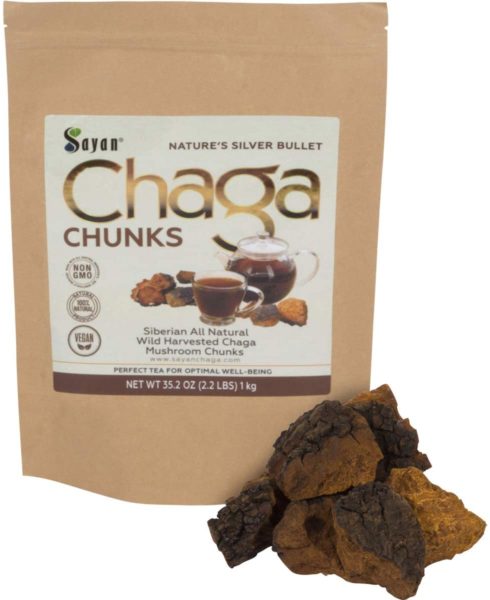
If you want chaga in bulk, Sayan is a good option. Their raw chaga comes in bags of up to two pounds each, harvested wild in Siberia. If you prepare a lot of chaga on a regular basis, or you want to keep large amounts of chaga on-hand (it keeps for years in the freezer), Sayan Chaga Chunks are a good option.
For most chaga users, though, we recommend raw chaga chunks that come in smaller batches that are sustainably harvested in North America.
8. Chi Chaga
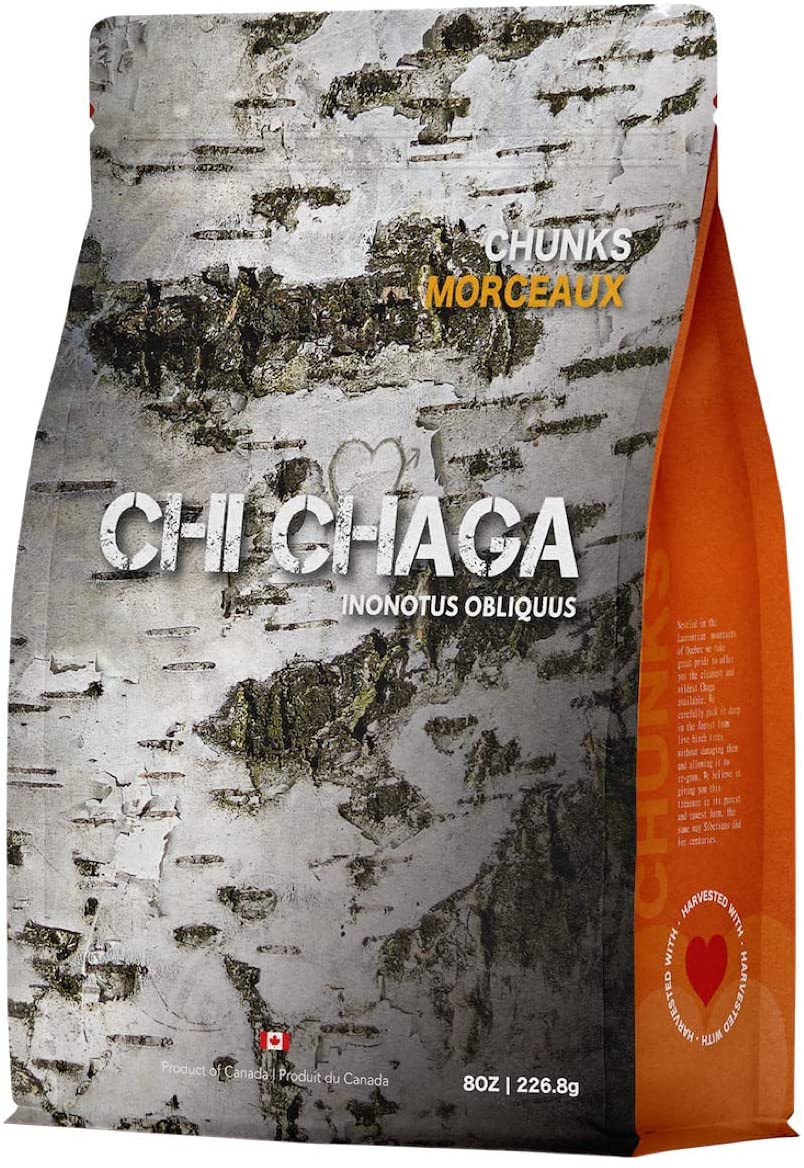
Chi Chaga provides wild-harvested chaga from Canada. This chaga powder comes in a bulk 8-oz bag and is pretty well-suited for shakes and smoothies, but is a bit too finely ground for making tea (raw chunks or granules are better-suited for steeping in tea).
9. Om Chaga
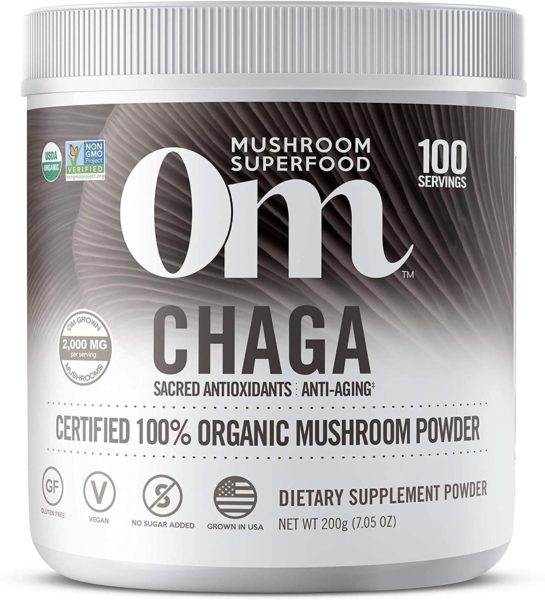
Om Chaga is a finely-powdered chaga mushroom product that comes in a convenient and easy to use plastic tub. It’s far less messy than resealable bags, and with over seven ounces of chaga in each plastic tub. The primary downside of Om Chaga is that it is not wild-harvested.
From a sustainability perspective, this is great, but chaga grown on organic oats may not have the same antioxidant profile as chaga grown naturally on birch trees in the forest.
10. Peak Performance Organic Chaga Mushrooms
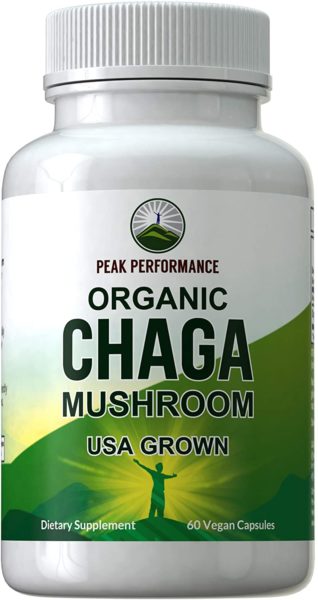
Peak Performance makes a simple and easy to use chaga supplement that uses a cellulose-based capsule to deliver 500 mg of chaga mushroom powder.
While it’s convenient and straightforward, it doesn’t offer some of the benefits you can get with raw chaga or chaga extracts—namely, you won’t be getting as much of a boost in antioxidant activity, because the full range of antioxidants haven’t been extracted using hot water, steam, or alcohol.
Peak Performance Organic Chaga also has the downside of not using wild-harvested chaga. Instead, the chaga mushrooms used are grown (albeit organically) on biomass in a farm.
While this keeps the cost down, it may also alter the biochemical profile. If you are convinced you want chaga capsules, it’s a decent option, but many people will want to opt for something else.
Category winners
Best chaga mushroom overall: Maine Chaga Powder
Maine Chaga is harvested both wild and sustainably, and it packs an incredible antioxidant punch. It’s powdered for easy mixing into smoothies and shakes, and thanks to its potency it’s an incredibly versatile chaga mushroom supplement for all purposes.
Best chaga mushroom for immune function: Maine Chaga Powder
Our top overall pick is also our recommended pick for immune function. This wild-harvested chaga is the best way to get the highly concentrated antioxidants, anti-inflammatories, and immune system boosters present in naturally-grown chaga, and the powder form makes it easy to adjust the dosage to fit your needs.
Best chaga mushroom for longevity: Micro Ingredients Organic Chaga Mushroom
The bulk-sized powder-form chaga mushroom from Micro Ingredients is perfect for people using chaga for longevity and for anti-aging supplement regimens, since they’ll likely be using higher doses over longer periods of time.
Best chaga mushroom for chaga tea: Maine Chaga Tea Chunks
Maine Chaga harvests the best raw chaga on the market, so if you’re looking to make chaga tea, there’s no better option than these wild-harvested chaga mushroom chunks. These chunks steep easier in water than powder, making them perfect for tea.
Best chaga mushroom for inflammation: Maine Chaga Powder
Chaga’s powerful anti-inflammatory properties are well-known, so it should come as no surprise that our top overall pick is also our recommendation when it comes to fighting systemic inflammation with chaga mushrooms Maine Chaga Powder blends up well into shakes and smoothies, and we prefer the powder form since it’s easy to dial up or down the dosage depending on your needs.
Best chaga mushroom capsules: Real Mushrooms Chaga Digestive Health
If you’d rather take chaga mushroom in pill form, check out Real Mushrooms Chaga Digestive Health. While powder-form chaga is better for people who want more control over their dosage, Real Mushrooms can’t be beat when it comes to convenience.
Who should buy chaga mushrooms?
Chaga mushroom supplements are a great choice if you want to try out one of the hottest new trends in antioxidant supplements. Though chaga mushrooms have long been used in traditional medicine, they’ve only recently been studied in formal scientific studies.
Chaga mushrooms show a lot of promise for reducing inflammation and oxidative damage, thanks to their high concentrations of a broad range of molecules that can capture and neutralize free radicals. These chemical properties have made chaga mushroom supplements particularly appealing to people looking to reduce DNA damage (for anti-aging and longevity purposes), reduce their risk of heart disease, and boost the functionality of their immune system.
In lab studies, chaga mushrooms show potent activity against inflammation, oxidative agents, and even cancer cells. Human studies are far more limited, but indicate that chaga mushrooms might help with psoriasis and peptic ulcers.
Along the spectrum ranging from potent and effective supplements whose efficacy has been demonstrated in large clinical trials, like vitamin D, calcium, and eye vitamins, to exciting but less-intensely studied compounds, chaga mushrooms definitely falls on the latter end.
If you want a supplement that’s been proven to work and to be safe in large clinical trials, chaga isn’t the best choice. However, if you trust the long history of traditional usage of chaga and you find some of the promising in-lab and animal-based studies interesting, it might be worth trying out.
Chaga isn’t well-suited for long-term use at high doses anyways, due to its high oxalate content, but it might be a good short-term or occasional solution to boost your immune system, improve your risk factors for heart disease, or fight inflammation and DNA damage in your body.
How we ranked
When formulating our chaga mushroom rankings, we focused exclusively on supplements whose sole active ingredient was chaga mushrooms. While there are a lot of medicinal mushroom supplements on the market that provide great combinations of multiple different beneficial mushrooms, our focus here was exclusively on chaga.
We tolerated a variety of sources and physical forms of chaga, from raw chunks to extracts, but made no compromises on ingredients.
After isolating chaga-exclusive supplements, we examined the delivery format. Powders and capsules are convenient, and took most of our top-ranked positions.
However, hardcore traditionalists may want raw chunks of chaga mushroom, and if you don’t want to bother with extracting chaga from powder or taking capsules, a liquid extract might be a better choice. To accommodate people with these preferences, we also made sure to rank at least a few chaga supplements in raw form and in liquid extracts.
We also considered the source of the chaga mushrooms themselves. We had a strong preference for chaga that was sourced in North America (either the US or Canada), since chaga from these regions is more likely to be pure and wild-harvested.
Because many chaga consumers are concerned about sustainability, we also rewarded products that used sustainable harvesting practices.
Chaga grows very slowly, so there is some concern that due to the high demand for chaga, aggressive over-harvesting could wipe out chaga from broad swaths of boreal forests in the northern hemisphere. For this reason, sustainably harvested chaga scored higher in our rankings.
For chaga supplements that came in capsules, we had a preference towards products that were at dosages close to those used in the few clinical trials conducted thus far (the equivalent of circa 15 to 45 mL of chaga extract). However, since there is so little information about the best dosage, this criteria played only a minor role in our rankings.
For chaga supplements that had already been extracted from the raw mycelium material, we had a preference for supplements that had been extracted using hot water or steam, since research suggests that steam and hot water extraction actually increases the antioxidant activity of the active compounds in chaga mushrooms.
As always, we also applied our strict criteria for purity and clean supplement design. Extra points went to chaga mushroom supplements that adhered to good manufacturing processes and kept their ingredients list as minimal as possible. Anything with too many additives, fillers, and stabilizers got dropped from consideration.
After taking all of these factors into consideration, we sorted the remaining products by overall quality to come up with our final rankings. We’re confident that these are your best options if you are looking for an effective and pure chaga mushroom supplement.
Benefits
Chaga contains compounds that can protect your DNA. Oxidative damage to your DNA is one of the leading causes of aging, and is implicated in many different chronic diseases, from heart disease to cognitive decline to cancer.
One of the most exciting properties of chaga mushrooms is their ability to reduce DNA damage in human cells. One scientific study demonstrating this effect was published in 2008 in the journal BioFactors, and involved researchers taking samples of white blood cells from patients with inflammatory bowel disease and matched healthy adults (1).
The cells from the subjects were exposing them to different levels of Chaga mushroom extract and inducing oxidative damage using hydrogen peroxide. The study showed that exposure to chaga extract had a substantial protective effect against the oxidative damage induced by the hydrogen peroxide.
These results suggest that the powerful antioxidant effects of chaga could help slow the aging process and reduce the kind of oxidative damage to cells that contributes to chronic disease, though more research in humans is needed to make substantive conclusions.
Extracting chaga with hot water or steam leads to more powerful antioxidant capabilities. One of the traditional methods of using chaga mushrooms has been in chaga tea—by taking a few chunks of raw chaga and simmering them in near-boiling water for anywhere from 20 minutes to four hours, you can make a deep, amber-colored chaga tea.
New research is showing that this method is an excellent way to increase the potency of chaga, and may result in biological effects that are more potent than what you’d get simply by taking a chaga powder supplement.
A study published in the journal Food Chemistry compared the concentration of phenolic compounds (which are powerful antioxidants) in raw, untreated chaga to the concentration on phenols in chaga that had been exposed to steam treatment (2).
The results showed significant increases in the phenolic content of the extracts pulled from the raw chaga material, suggesting that a hot water based extraction method, like making chaga tea, will enhance the bioavailability of many of the active compounds found in chaga mushrooms.
These findings were one of the main reasons we ranked powdered and raw chaga products higher than capsule-based supplements in our rankings: if you can, we strongly recommend making chaga tea as opposed to taking capsules to get the maximal antioxidant boost.
Chaga extract could boost your immune system. According to research published in 2005 in Korea, lab animals fed a chaga supplement displayed significant increases in levels of a specific type of protein that regulates your immune system, called TNF alpha (3).
The levels of TNF alpha in the treated mice increased in as little as eight days after adding chaga extract to their diet. These results are very promising for using chaga to your immune system’s activity level, though there haven’t been any follow-up studies in humans to replicate this result.
Additionally, it is difficult, if not impossible, to extrapolate appropriate dosage levels from animal studies like these to infer appropriate doses for humans.
Animal research has also shown that chaga mushrooms can protect against some of the negative effects of obesity. A classic experimental method to study the effects of various supplements is to give animals a high-fat diet, which reliably induces the same kinds of metabolic problems seen in obese humans: high blood lipids, high blood pressure, systemic inflammation, and so on.
Research on chaga mushrooms has found that adding chaga mushrooms to the diet of mice protects them from many of the negative effects of this kind of high fat diet. One such study was published in 2008 by researchers in Korea (4).
In it, mice fed a high-fat diet were shown to have a lower weight, less abdominal fat, and lower blood glucose levels when they had consumed a chaga mushroom extract in addition to the high fat diet.
As with many of the other promising research findings on chaga mushroom, these results should be replicated in humans before they are taken as fact, but nevertheless the preliminary evidence suggests that chaga could be useful for preventing some of the adverse health effects of high fat diets, and by extension, obesity in general.
Side effects
Given the extremely limited amount of data from research in humans, it’s very difficult to characterize the possible side effect profile of chaga mushrooms. The lack of substantial data in people is one of the biggest limiting factors that hold back many nutrition and supplementation experts from recommending usage of chaga mushrooms.
Most of the justification for its safety comes from its long history of use in traditional medicine, though that is not a foolproof guarantee that it is safe. One important consideration from a side effects and safety perspective is the extremely high concentration of oxalate.
Small to moderate amounts of oxalate aren’t usually a concern for most people—foods like navy beans, okra, almonds, spinach, chocolate and cacao powder contain high amounts of oxalate, and are all considered quite healthy.
However, for people with conditions like gout, rheumatoid arthritis, or a history of kidney stones, consuming high amounts of oxalate can aggravate their health conditions.
A case report published in 2014 detailed a case of kidney damage in a 72 year old Japanese woman who had been taking chaga mushroom powder on a regular basis for six months (5). The doctors who treated her found oxalate crystals in her kidneys and blamed these for damaging her kidneys.
The extremely high concentration of oxalates in chaga mushrooms suggests that chaga should not be used continuously for long periods of time, especially at high doses.
People with a history of kidney problems should probably not take chaga, as is the case with anyone with a history of oxalate-related health conditions or anyone who is supposed to be on a low-oxalate diet.
Another area of potential side effects that are unclear due to a lack of evidence are potential interactions between chaga and prescription medications. Some of the areas of possible application for chaga mushroom extract, like blood platelet coagulation, may indicate the possibility for adverse drug-supplement interactions.
As always, it is recommended that you talk to your doctor first if you are on a prescription medication and are thinking about starting a new supplement.
Recommended dosage
Because of the extremely limited data on human studies of chaga, it’s very difficult to come up with clear recommendations for ideal dosage. According to one review study by Megan Frost at Brigham Young University, only two clinical trials of chaga mushroom have been conducted, both of which were conducted in Russia and were not blinded or randomized trials (6).
Nevertheless, these trials did provide dosing information. The studies examined doses ranging from 4.5 ml/day to 90 mL/day, with dosage measured in terms of volume of a 10% ethanol liquid chaga mushroom extract. A second study used a similar product at a dose of 15 mL three times per day, taken about half an hour before meals.
It’s hard to scale these doses to an equivalent dose of raw chaga, hot chaga tea, or chaga powder, for two reasons: first, these studies were not clear on the concentration of any of the potentially active compounds in their extracts, which makes direct dosing difficult.
Compare this situation with studies on supplements like green tea extract, which specifically standardize their extracts to contain a set amount of the primary active ingredient, EGCG.
Second, extracting chaga with hot water or steam is known to increase the activity of the antioxidants in chaga, as discussed above (7).
While we can’t make solid recommendations on the amount of chaga to take, we do recommend using a hot water extraction method (like making chaga tea) if possible, based on the research indicating that exposure to hot water or steam activates more powerful antioxidants in chaga mushrooms.
Making chaga tea or a hot water extract takes a bit more time, but is worth it to get a more powerful benefit from chaga mushroom.
FAQ
Q: How do you make chaga mushroom tea?
A: The best way to make chaga mushroom tea is with raw chunks of chaga mushroom. Take one or two of these chunks and simmer them in water that is just below boiling temperature. The chaga should be simmered for at least 20 minutes; some medicinal mushroom enthusiasts suggest much longer periods of four to eight hours.
Once simmering is complete, you can fish out the solid chunks of chaga mushroom and enjoy the tea. It’s also possible to make chaga tea with powdered chaga; in this case you should simmer for slightly less time.
While chaga powder will not dissolve in water, it will settle into a sediment-like residue if you don’t filter or strain it. For this reason, we recommend chaga chunks if you are making chaga tea.
Q: How do you take a chaga mushroom supplement?
A: There are four primary methods that people take chaga. The first, discussed above, is to take raw chaga (the preferred method) or chaga powder and simmer it in hot water to make tea.
Matters of convenience aside, this is probably the best method, as it activates and extracts the most antioxidants. You can also skip the simmering and mix chaga powder into a smoothie or shake, or take chaga mushroom supplements that deliver chaga powder in capsules.
These are easier and less messy methods of taking chaga, but the downside is that you might not get quite the same level of antioxidants.
Finally, one other workaround to the convenience issue is to use a chaga elixir or liquid extract—while these supplements are less cost effective, they are easy to use and may extract a greater proportion of antioxidants from the raw chaga material versus consuming chaga powder.
Q: Can chaga mushrooms be used for weight loss?
A: So far, there is no direct research on chaga for weight loss in humans. However, some animal research does support the idea that chaga mushrooms contain compounds which might reduce abdominal fat buildup and reduce some of the negative effects of obesity and an unhealthy diet.
Whether these findings translate to humans, and whether these findings also apply if you aren’t on a very unhealthy diet, remains to be seen in future research.
Q: Does chaga mushroom get you high?
A: No, chaga mushrooms are not psychoactive. Unlike some of the better-known psychoactive mushrooms like psilocybin mushrooms, no hallucinogenic or psychoactive compounds are found in chaga mushrooms. This also means that chaga mushrooms are completely legal to buy, sell, and harvest.
Q: What is chaga mushroom elixir?
A: Chaga mushroom elixir is a solution of chaga mushroom extract that has been dissolved in an alcohol/water mixture. Chaga elixir has the potential benefit of providing more antioxidants than consuming raw chaga, but without the time investment of boiling or simmering raw chaga to make it into chaga tea.
More antioxidants are released from chaga if they are exposed to steam or boiling water, so the ideal chaga elixir is one that is exposed to ethanol, and boiled in water to extract the maximum amount of antioxidants.
Chaga elixir tends to be less cost-effective than raw chaga because of all of this processing that goes into making it.
Q: How do you make chaga mushroom coffee?
A: Mushroom coffee is a popular way to get the benefits of medicinal mushrooms, but incorporating chaga into coffee is tricky—chaga needs to be steeped for a long time to extract the antioxidants.
So, while you could combine chaga powder with coffee grounds, this isn’t likely to lead to high levels of chaga antioxidants in your coffee.
Instead, it’s better to take some pre-steeped chaga tea (perhaps made extra-strong by adding more chaga or concentrating the liquid) to your coffee after you make it. This is the best way to incorporate the antioxidants in chaga into your coffee.
Q: Can you have too much chaga mushroom?
A: The primary concern with taking too much chaga mushroom has to do with its oxalate content. Oxalates are a type of salt that are the primary constituent of many kidney stones, and have been implicated in other conditions like gout and rheumatoid arthritis (8).
Chaga has more oxalates than any known food, and while moderate amounts of oxalates are okay for healthy people (foods like spinach, okra, and navy beans are also high in oxalate), too much oxalates can cause problems, especially in people with pre-existing conditions.
Chaga should not be used by anyone with kidney stones or other kidney conditions, and should not be used by people on low-oxalate diets.
Q: What does chaga mushroom look like?
A: Chaga mushroom looks like a large, charcoal or coal-like growth that blisters out of the side of a tree. It has an amber body that is usually mottled by very dark brown or black coloring due to the extremely high levels of melanin produced by wild chaga (incidentally this is the same molecule that makes your skin more tan in response to sunlight).
Chaga is fairly easy to spot because it stands out from the white bark of the birch trees it tends to grow on; however it’s often found growing very high up and out of reach. Chaga grows on cuts, scars, and stumps from broken-off branches of trees, all of which can occur very high up on the trunk of a tree.
Q: Where can you find chaga mushroom in the wild?
A: Chaga grows in northern boreal forests, like those found in Maine, Canada, Minnesota, and Siberia (in Russia). Chaga grows almost exclusively on birch trees, though rarely it will be found in a few other kinds of trees like elm and beech trees as well.
Hunting for chaga in the wild can be extremely difficult—not only does it only grow in remote regions, but it often grows high up on trees. A birch tree, for example, can get up to 70 feet tall!
Unless you’re a very intrepid adventurer, you’ll have better luck and less trouble buying chaga versus trying to find it in the wild. You can get raw dried chaga that has been wild-harvested by mushroom experts and retains all the beneficial antioxidants, for far less trouble.
Q: What kind of trees does chaga mushroom grow on?
A: Chaga is best-known for growing on birch trees, but in rare cases can be found on elm trees and beech trees as well. When it’s grown on farms, it is usually grown on oatmeal, though this may not result in the same profile of antioxidants.
Chaga grows over the course of many years, so to maintain sustainable levels of chaga in the wild it’s important to buy from manufacturers who follow sustainable harvesting practices if they wild-harvest their chaga mushrooms.
Related articles
- Medicinal mushrooms
- Mushroom coffee
- Edible flowers
- Immune system supplements
- Astaxanthin
- Lycopene
- Resveratrol
- Ashwagandha
Recap
Chaga mushroom contains powerful antioxidant and anti-inflammatory agents. Though research in humans is scarce, it has a long history of use in traditional medicine, and several experiments in the lab and in animal models suggest that chaga could hold lot of promise for counteracting DNA damage and inflammation.
This reduction might help with slowing down the aging process, preventing some of the negative effects of obesity and high-fat diets, and reducing some of the major risk factors for heart disease.
While it’s not for everyone due to its high oxalate content and limited research on long-term use and proper dosage, it’s nevertheless one of the most promising supplements, whose secrets will hopefully be unlocked in new research in the future.
For BodyNutrition‘s #1 chaga mushroom recommendation, click here.